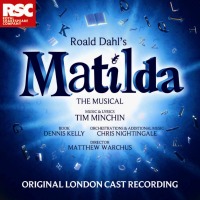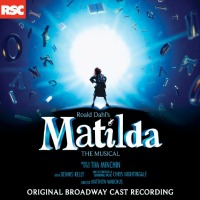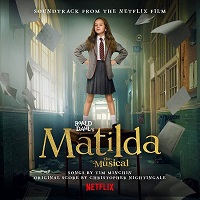 Original London Cast, 2013 (RSC)
Original London Cast, 2013 (RSC)  (5 / 5) This recording reflects the Royal Shakespeare Company’s world premiere production of the musical Matilda, based on Roald Dahl’s book about a precocious, five-year-old British girl. A rather dark, cerebral show that also happens to be wickedly funny, charming, and moving, Matilda is in some ways the antidote to Annie; whereas the redheaded orphan patiently waited for the sun to come out tomorrow, Matilda fights to change her life and the bad deck of cards she has been dealt, including a moronic family that doesn’t care about her and a fearsome headmistress who hates children in general. For his first musical theater work, Australian comedian Tim Minchin has written a stellar score, one with playfully odd melodies and deliciously smart lyrics that fit the wonderfully twisted world of Dahl perfectly. There’s much fun to be had in “Naughty,” “Telly,” and other songs; and when Matilda shows its heart, it thankfully doesn’t wear it on its sleeve like so many children-centered shows. Songs such as “Quiet” and “My House” are simple and understated (a rarity in modern musical theater), allowing the actors to live in them and explore their dramatic potential. Christopher Nightingale’s orchestrations are by turns playful (“Miracle”), funky (“Revolting Children”), and beautiful (“I’m Here”). The cast of this recording is wonderful, with three young performers covering different tracks of Matilda (because they rotated in the role on stage). Special praise goes to Bertie Carvel, who plays the headmistress, Miss Trunchbull. Avoiding camp, Carvel instead performs like a dry, British piranha, making the character’s evilness funny yet still menacing. Perhaps the greatest song on this album is “When I Grow Up, ” by far the most uplifting number in the score: “When I grow up / I will be brave enough to fight the creatures / That you have to fight beneath the bed / Each night to be a grown up.” It reveals that, for all its cleverness and mischief, Matilda is at its core an optimistic show. — Matt Koplik
(5 / 5) This recording reflects the Royal Shakespeare Company’s world premiere production of the musical Matilda, based on Roald Dahl’s book about a precocious, five-year-old British girl. A rather dark, cerebral show that also happens to be wickedly funny, charming, and moving, Matilda is in some ways the antidote to Annie; whereas the redheaded orphan patiently waited for the sun to come out tomorrow, Matilda fights to change her life and the bad deck of cards she has been dealt, including a moronic family that doesn’t care about her and a fearsome headmistress who hates children in general. For his first musical theater work, Australian comedian Tim Minchin has written a stellar score, one with playfully odd melodies and deliciously smart lyrics that fit the wonderfully twisted world of Dahl perfectly. There’s much fun to be had in “Naughty,” “Telly,” and other songs; and when Matilda shows its heart, it thankfully doesn’t wear it on its sleeve like so many children-centered shows. Songs such as “Quiet” and “My House” are simple and understated (a rarity in modern musical theater), allowing the actors to live in them and explore their dramatic potential. Christopher Nightingale’s orchestrations are by turns playful (“Miracle”), funky (“Revolting Children”), and beautiful (“I’m Here”). The cast of this recording is wonderful, with three young performers covering different tracks of Matilda (because they rotated in the role on stage). Special praise goes to Bertie Carvel, who plays the headmistress, Miss Trunchbull. Avoiding camp, Carvel instead performs like a dry, British piranha, making the character’s evilness funny yet still menacing. Perhaps the greatest song on this album is “When I Grow Up, ” by far the most uplifting number in the score: “When I grow up / I will be brave enough to fight the creatures / That you have to fight beneath the bed / Each night to be a grown up.” It reveals that, for all its cleverness and mischief, Matilda is at its core an optimistic show. — Matt Koplik
 Original Broadway Cast, 2013 (Yellow Sound Label/Broadway Records)
Original Broadway Cast, 2013 (Yellow Sound Label/Broadway Records)  (3 / 5) Here we have a rare situation: a London cast album is actually preferable to the recording of the Broadway incarnation. While all of the new performers are as talented as their predecessors, and much is the same in terms of material (there is more dialogue included on the OBC recording, and there are some minor lyric changes), something is slightly off here. In trying to “Broadway-ize” the piece, Matilda’s creators made the show a difficult listening experience. Perhaps the biggest problem is/are the new orchestrations by Christopher Nightingale; brassy and brash, they frequently overpower the singers (even on the recording), making it hard to understand Minchin’s brilliant lyrics. Perhaps to compete with the orchestra, the performances of this cast are broader and less human than those of the British company. Even Bertie Carvel, repeating his role of Miss Trunchball, seems less funny and more fidgety than before. On the bright side, Lauren Ward as Miss Honey, also returning from the London production, is just as touching and perhaps even stronger vocally than on the previous recording. She is the sole caring adult character, and the beating heart of the show. All of the Matildas here — four of them, as opposed to the British three — are smart actresses and talented singers. Thankfully, for their tracks, Nightingale chose to remain faithful to his original orchestrations. — M.K.
(3 / 5) Here we have a rare situation: a London cast album is actually preferable to the recording of the Broadway incarnation. While all of the new performers are as talented as their predecessors, and much is the same in terms of material (there is more dialogue included on the OBC recording, and there are some minor lyric changes), something is slightly off here. In trying to “Broadway-ize” the piece, Matilda’s creators made the show a difficult listening experience. Perhaps the biggest problem is/are the new orchestrations by Christopher Nightingale; brassy and brash, they frequently overpower the singers (even on the recording), making it hard to understand Minchin’s brilliant lyrics. Perhaps to compete with the orchestra, the performances of this cast are broader and less human than those of the British company. Even Bertie Carvel, repeating his role of Miss Trunchball, seems less funny and more fidgety than before. On the bright side, Lauren Ward as Miss Honey, also returning from the London production, is just as touching and perhaps even stronger vocally than on the previous recording. She is the sole caring adult character, and the beating heart of the show. All of the Matildas here — four of them, as opposed to the British three — are smart actresses and talented singers. Thankfully, for their tracks, Nightingale chose to remain faithful to his original orchestrations. — M.K.
 Film Soundtrack, 2022 (Masterworks Broadway)
Film Soundtrack, 2022 (Masterworks Broadway)  (4 / 5) When Matilda was being developed as a film, the entire original creative team was brought on to head the adaptation, which turned out well. Extremely well. As evidenced by this soundtrack album, Roald Dahl’s Matilda The Musical — the official title given to the movie by its distributor, Netflix — is just as sweet, edgy and unapologetically weird as the stage version. Christopher Nightingale has expanded his original orchestrations, and this recording is mixed in such a way that those orchestrations are not overwhelming, as they sometimes are on the Broadway cast album. Also, a much larger chorus of child actors bolsters major ensemble numbers such as “When I Grow Up” and “Revolting Children.” Since this is a movie with no rigorous, eight-shows-a-week performance schedule, only one actress is called on for the title role: 11-year-old Alisha Weir, who displays a perfect balance of precociousness and innocence as Matilda. In a departure from the stage version’s British panto approach to the character Trunchbull, Emma Thompson has stepped into the evil headmistress’ shoes. More overtly menacing than Bertie Carvel, Thompson appears game for anything and throws herself into the role, giving “The Hammer” and “The Smell of Rebellion” the proper mix of danger and hilarity that they require. Lashana Lynch is a lovely Miss Honey, making the most of “My House” and “Still Holding My Hand,” an effective new finale that Tim Minchin wrote for the film as a duet between Miss Honey and Matilda. There are some minor gripes with this recording: Though the cutting of the songs “Loud” and “Telly” isn’t an offensive choice, Andrea Riseborough and Stephen Graham make such a strong impression as Matilda’s horrible parents in “Miracle” that one wishes they had more opportunities to shine. And while the soundtrack includes the music for each of Matilda’s chapters on the Acrobat and Escapologist story, for some reason it doesn’t include any of Weir’s narration — a mistake, as the tracks now play more like background music than theatrical storytelling. So in order to hear Weir’s charming performance of these stories, you’ll have to watch the movie, which isn’t a hardship by any means. — M.K.
(4 / 5) When Matilda was being developed as a film, the entire original creative team was brought on to head the adaptation, which turned out well. Extremely well. As evidenced by this soundtrack album, Roald Dahl’s Matilda The Musical — the official title given to the movie by its distributor, Netflix — is just as sweet, edgy and unapologetically weird as the stage version. Christopher Nightingale has expanded his original orchestrations, and this recording is mixed in such a way that those orchestrations are not overwhelming, as they sometimes are on the Broadway cast album. Also, a much larger chorus of child actors bolsters major ensemble numbers such as “When I Grow Up” and “Revolting Children.” Since this is a movie with no rigorous, eight-shows-a-week performance schedule, only one actress is called on for the title role: 11-year-old Alisha Weir, who displays a perfect balance of precociousness and innocence as Matilda. In a departure from the stage version’s British panto approach to the character Trunchbull, Emma Thompson has stepped into the evil headmistress’ shoes. More overtly menacing than Bertie Carvel, Thompson appears game for anything and throws herself into the role, giving “The Hammer” and “The Smell of Rebellion” the proper mix of danger and hilarity that they require. Lashana Lynch is a lovely Miss Honey, making the most of “My House” and “Still Holding My Hand,” an effective new finale that Tim Minchin wrote for the film as a duet between Miss Honey and Matilda. There are some minor gripes with this recording: Though the cutting of the songs “Loud” and “Telly” isn’t an offensive choice, Andrea Riseborough and Stephen Graham make such a strong impression as Matilda’s horrible parents in “Miracle” that one wishes they had more opportunities to shine. And while the soundtrack includes the music for each of Matilda’s chapters on the Acrobat and Escapologist story, for some reason it doesn’t include any of Weir’s narration — a mistake, as the tracks now play more like background music than theatrical storytelling. So in order to hear Weir’s charming performance of these stories, you’ll have to watch the movie, which isn’t a hardship by any means. — M.K.

